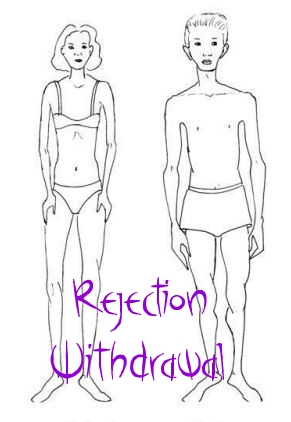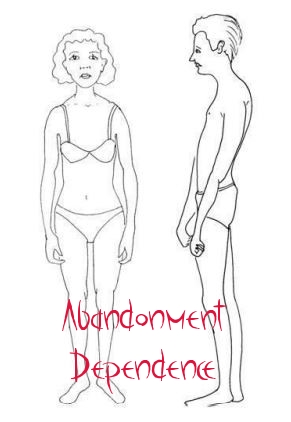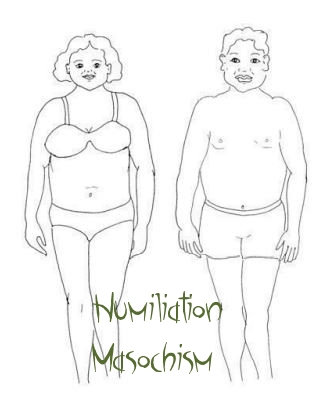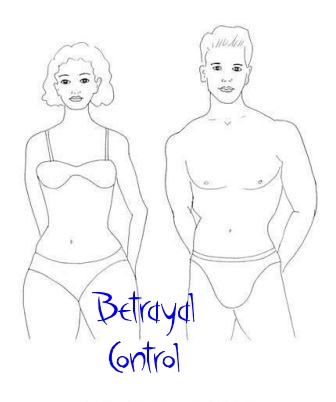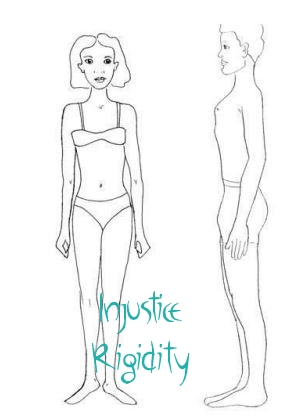Welcome and Congratulations for choosing to embark on this journey where you are taking a step further in healing what you feel is wounded "inside you". I will be providing you here with ~50 days worth of affirmations and insights with regards to Healing Emotional Wounds, as brought about by Lise Bourbeau in her amazing book, Heal Your Wounds and Find Your True Self, which I strongly recommend and use in my work.
This will be an experiential and experimental boot-camp meant to guide you through accessing your wounds and treating them with loving compassion. If at any time, you feel anything in your body that resembles a constrictive reaction/sensation when reading these, that is your sign that that wound and that particular manifestation is present in your body and thus your life.
I will give you 10 elements for each wound that, in most cases, will be enough for you to work on by yourself. This is the part of the course that is FREE for you to contemplate and bring awareness into.
BONUS: HOW TO FEEL
When you are contemplating any of these affirmations (which I will further call "tablets"), notice there are three things going on simultaneously:
- the physical circumstances in which they often occur - linked to someone's behaviour or some circumstances
- then there's also the story you're telling yourself the moment you see these "tablets" and, underlying the story there's also
- a feeling - this feeling may be translated by the mind as fear, anger or grief or a mixture of those three
- Where do you feel that feeling in your body now?
- Notice how, as you listen to that feeling or you watch that feeling, the mental body may say: what's the purpose of this, what's supposed to happen, how long will this take? It asks questions…. allow it to ask its questions and to do what it wants to do, but your focus should be to simply watch that feeling and listen to it without any conditions placed upon it… just watch that feeling and listen to it!
- You're not trying to accomplish anything in this task, you're simply noticing the feeling that comes up and where it is in the body and allowing it to be there and allowing yourself to be with it.
- Notice how that feeling corresponds to physical places in our body that, when you bring that theme up into your mind, you feel those physical places in your body come into your awareness. …just be with that sensation because it is there - not being with it to change it, not being with it to understand it, not being with it to move it through your chakras, just be with it without condition, be with it because it is there.
This exercise of being without condition is actually what we can also call a not doing - we're bringing up an awareness of the emotional signature and we're not doing anything with it, we're just being without condition. Being without condition is very different from trying to do something, from trying to do something to feel better, from trying to sedate and control our awareness of our discomfort.
Our doings have results and we tend to judge the results based upon whether we feel better or not, or whether we sedate and control our discomfort or not. If we feel better, if we sedate and control our discomfort, then we believe that we're getting good results, but doings may give us release and relief for a few moments, but they do not bring us to resolution. The task we're setting ourselves now is about resolution. Being without condition is not about results, but it does have consequences. The consequence is that it brings to us what we require in order to resolve these causal emotional signatures that are ongoing in our body, whether we're aware of them or not.
If you need deeper immersion into the healing of these wounds, I offer several options:
A more in-depth explanation of each wound's most common characteristics and manifestations
1 on 1 daily coaching for all of the wounds: ~50 days worth of personal coaching for those of you who require in-depth specialized guidance
Personalized Assessment of a Complete Wound
Please click on the images to enter specific affirmations for each wound, where I will be listing affirmations for healing that particular wound.(Depending on when you are visiting this website, they might not all be there, so please go to: https://www.facebook.com/AylaByIngrid2020 to see the progress)
Rejection
The awakening of the wound: from conception to one year old.
Don’t believe they have the right to exist.
With the parent of the same sex.
Mask: Withdrawer
Body: Contracted, narrow, thin or fragmented.
Eyes: Small, fearful or give the impression that there’s a mask around the eyes.
Vocabulary: “Hopeless” “Nothing” “Non-existent” “Disappear”
Character: Detached from the material world. Perfectionist. Intellectual. Go from great love to deep hate. Don’t believe in their right to exist. Sexual difficulties. Think they are hopeless, worthless. Seek solitude. Withdrawn. Are able to make themselves invisible. Find different ways to withdraw. Can easily have out of body experiences. Feel misunderstood. Find it difficult to let their inner-child live.
Greatest fear: panic
Eating habits: appetite spoiled by emotions or fear. Small portions. Escape through sugar, alcohol or drugs. Predisposition to anorexia.
Possible illnesses: Skin problems, diarrhoea, arrhythmia, cancer, breathing problems, allergies, vomiting, fainting, coma, hypoglycemia, diabetes, depression, suicidal tendencies, psychosis.
Awakening of the wound: Between one and three years old with the parent of the opposite sex.
Lack of affection or of the desired type of affection.
Mask: Dependent
Body: Long, thin, lack of tone, sagging, weak legs, rounded back, arms seem too long and hang
close to the body, parts of the body that hang or are flabby.
Eyes: Big, sad. A look that draws.
Vocabulary: “absent” “alone” “I can’t stand...” “I’m being eaten”
Character: Victim; need to bond. Need presence, attention, and above all support. Have difficulty
doing or deciding alone. Ask for advice they don’t necessarily follow. Childlike voice.
Difficulties accepting when people say no. Sadness. Cry easily. Attract pity. One day happy, one
day sad. Physically hang on to others. Psychic. Star. Seek independence. Like sex.
Greatest fear: Solitude
Eating habits: Good appetite. Bulimic. Like soft foods. Eat slowly.
Possible illnesses: Back, asthma, bronchitis, migraines, hypoglycemia, agoraphobia, diabetes,
adrenal glands, myopia, hysteria, depression, rare and incurable diseases that attract attention.
Humiliation
The awakening of the wound: Between one and three years old with the parent who took care of physical development, generally the mother. Lack of freedom. Feeling humiliated by that parent’s control.
Mask: Masochist
Body: Fat, round, short waist, rounded chubby neck, tension in the neck, throat, jaw and pelvis. Round, open face. Many parts of the body are round and chubby.
Eyes: Big, round, open and innocent like those of a child.
Vocabulary: “worthy” “unworthy” “small” “fat”
Character: Frequently ashamed of themselves and of others or fear making someone ashamed of them. Don’t like going fast. Know their needs but don’t satisfy them. Take a lot on. Control to avoid shame. Believe they’re unclean, heartless, pigs, beneath others. Need to bond. Make sure that they’re not free because “being free” means “unlimited.” If they have no limits, they’re frightened of going too far. Play being mother. Oversensitive. Punish themselves believing they’re punishing others. Want to be worthy. Feel disgust. Sensual, but ashamed on the sexual level and don’t satisfy their needs. Compensate and reward themselves with food.
Greatest fear: Freedom
Eating habits: Like fatty foods, chocolate. Bulimic or several small portions. Ashamed of buying or eating “treats.” Eat while standing up in order to believe that they haven’t eaten a real meal (but they probably ate more than a normal meal).
Possible illnesses: Back problems, shoulders, throat, tonsillitis, laryngitis, breathing problems, legs, feet, varicose veins, sprains, fractures, liver, thyroid gland, itchy skin, hypoglycemia, diabetes, heart.
Betrayal
The awakening of the wound: Between two and four years old with the parent of the opposite sex. Breach of trust or unfulfilled expectations in their love/sexual connection. Manipulation.
Mask: Controller.
Body: Exudes strength and power. For men, shoulders wider than hips. For women, hips wider than shoulders. Protruding chest. Protruding stomach.
Eyes: Intense, seductive look. Eyes that see everything quickly.
Vocabulary: “Dissociated” “I’m able/capable” “Let me do it by myself” “I knew it” “Trust me” “I don’t trust him” “Do you understand?”
Character: Believe they’re responsible and strong. Want to be special and important. Don’t keep their promises and their commitments or force themselves to keep them. Lie easily. Manipulating. Charmers. Have great expectations. Moody. Convinced they’re right and try to convince others. Impatient. Intolerant. Understand and act fast. Perform to be noticed. Comedian. Don’t confide easily. Don’t show their vulnerability. Skeptical. Fear broken commitments.
Greatest fear: Dissociation, separation, being cast aside.
Eating habits: Good appetite. Eat fast. Add salt and spices. Can control themselves when busy but then lose control.
Possible illnesses: Illnesses linked to control and loss of control, agoraphobia, spasmophilia, digestive system, illnesses ending in “itis,” mouth sores.
Injustice
Awakening of the wound: Between three and five years old with the parent of the same sex. Must perform and be perfect. Block their individuality.
Mask: Rigid.
Body: Straight, rigid and as perfect as possible. Well proportioned. Round bottom. Small waist marked by clothes with fitted waists or belts. Rigid movements. Clear skin. Clenched jaw. Stiff neck held proudly.
Eyes: Bright and lively. Clear.
Vocabulary: “No problem” “Always/never” “Very good/very well” “Very special” “Precisely” “Exactly” “Surely” “Do you agree?”
Character: Perfectionist. Envious. Cut off from feelings. Often cross their arms. Perform to be perfect. Over-optimistic. Lively, dynamic. Justify themselves. Have difficulty asking for help. Can laugh for no reason to hide their sensitivity. Tone of voice is dry and abrupt. Don’t admit they have problems. Doubt their choices. Compare themselves - better/worse. Have difficulty receiving in general. Find it unfair to receive less than others but even more unfair to receive more. Have difficulty in enjoying themselves without feeling guilty. Don’t respect their limits, ask a lot of themselves. Rigidly control themselves. Like tidiness. Rarely ill, hard on their bodies. Quick-tempered. Cold, with difficulty showing their affection. Like to look sexy.
Greatest fear: Coldness.
Eating habits: Prefer salty food to sweet. Like anything crunchy. Control their weight. Justify themselves and are ashamed when they lose control.
Possible illnesses: Burnout. Unable to reach orgasm (women). Premature ejaculation or impotence (men). Illnesses finishing in “ITIS,” such as tendinitis, bursitis, arthritis, etc. Torticollis, constipation, haemorrhoids, cramps, poor blood circulation, liver problems, varicose veins, skin problems, nervousness, insomnia, bad eyesight.


